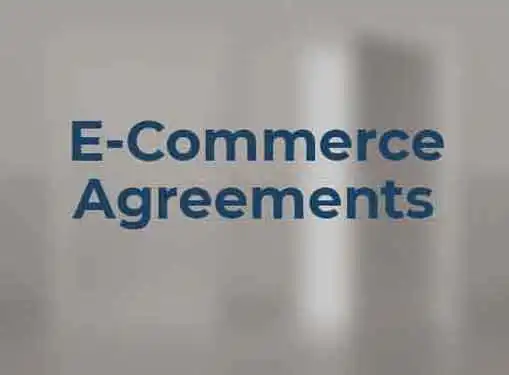Small Business Technology
E-Commerce Agreements
In an era where tons of commerce is connected on the Internet, it's no surprise that e-commerce agreements have grabbed centerstage in the legal world. When partnering with another company to sell products or services via your website, make sure you have your legal bases covered.
From online catalogs to inventory management, the internet has revolutionized the way small businesses do business.

Some small business owners have used the internet to create strategic partnerships with other firms, selling other companies products on their company's website. But with so much high-tech cross-selling going on, how do you provide adequate legal protection for your business?
E-commerce agreements are your best defense against legal snafus related to third-party sales through your website. The benefits of online strategic partnerships can be significant. By offering a complementary product or service provided by someone else, you can position yourself as a one-stop shopping solution. E-commerce agreements provide structure for your relationships with online, third-party providers by establishing a framework of understanding that covers a broad range of issues.
The details of an e-commerce agreement are dictated by the specific needs of the relationship, and the products or services that are being offered. However, there are some issues every e-commerce agreement should discuss. Here are some of them . . .
Products or Services
An e-commerce agreement wouldn't be worth much if it didn't cover the products or services it covers. It could be a few individual items, but it could also be a whole line of products and merchandise. Either way, you have to spell it out - upfront and on paper.
Customer Data & Payment Method
The information customers provide when they purchase a product is a commodity because it can be essential for future marketing initiatives. The e-commerce agreement needs to describe who owns that information and who will have access to it later on. Also, the e-commerce agreement must discuss how customers will pay for the purchases, whether it is through your business or through the third-party.
Trademarks are legally protected symbols and logos. As such, you can't just indiscriminately paste other people's trademarks on your site. You need permission to display trademarked material, and if you plan to exhibit them the e-commerce agreement is the place to talk about it. The trademark rights granted in an e-commerce agreement are usually limited use rights, so make sure to provide as much detail as you need to accurately describe the permitted uses.
Fees
It's common for the owner of the web site to receive a fee based on the amount of products and services that are sold from the site, typically in the form of a commission. It's up to you to negotiate the fee percentage, but keep in mind that you may want to settle for a slightly lower fee if the inclusion of the third-party's product on your site actually increases sales of your own products.
Term
Finally, the e-commerce agreement needs to describe the term of the relationship. Annual agreements are common, although some companies find it more beneficial to not specify a term and instead allow either party to terminate the relationship at any time with 30 or 60 days notice.
Share this article
Additional Resources for Entrepreneurs






Conversation Board
We greatly appreciate any advice you can provide on this topic. Please contribute your insights on this topic so others can benefit.